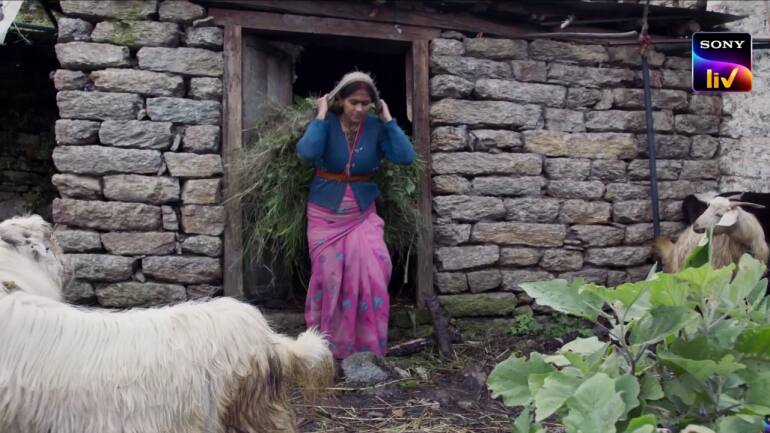



"The hills are calling!" is an Indian summertime manifesto you hear or read at least once every year. Like dreams you remember because they’re kind to you, the hills serve as tangible destinations for wool-gathering thoughts like ‘quitting the race’, ‘slowing life’ and so on. It’s the kind of idiomatic fantasy that assigns the mountains a functional value, a certain materiality in the imagination of the person who has only viewed it from below. But for those who live on them, navigate them as matter of existence, the hills are harsh, unyielding reminders of humility. No matter how feral the spirit or voracious our capacity to climb, no mountain can ever really be conquered. It can only be paid homage. To which effect Ajitpal Singh’s Fire in the Mountains, is a near perfect study of alienation and toxicity that hides behind the membrane of touristy overtures that have turned India’s hill stations into fetishised spiritual tokens.
Fire in the Mountains centres on the story of Chandra played by a stunning Vinamrata Rai. Married to Dharam (Chandan Bisht), she runs a small homestay somewhere in the Kumaon hills of Uttrakhand. Impoverished and burdened by the responsibility of an alcoholic husband, a wayward daughter, a deceptively quiet son and a sister-in-law without a home, Chandra is as unguarded, and stiff as the mountains she wakes up to every day. From haggling for a few hundred rupees, to fighting battles of faith and morality, she oversees the deprivation of a household that insists on splitting along each of its many ends. What adds to the dexterity of the structure, is the presence of the other woman, the widow (sister-in-law) whose loneliness even a suffering Chandra struggles to empathize with.
The hills have been fetishised by Hindi cinema as the place where dry prose and stuttering plots go to become some sort of vague poetry. There is no recourse for this kind of packaging, for everything that sweepingly lusts after the slopes uninterested in the challenges of their lived-in realities, culls in terms of autonomy that which it supplies generously as collage of ‘stunning’ visuals. From the boom of films set in Kashmir in the '70s, to Imtiaz Ali’s more recent, and reductive portrayal of the hills, everything that has apathetically groped mountains for vague visual pleasures has only consigned them to cultural inconspicuousness.
Singh’s vision, on the other hand, is educative. His frames resist amorously gaping at the scenery. They are instead more interested in constructing a world where the air suggests a breathability but the suffocating nature of gendered roles bog you down. Where innocence is never the essence but it almost always is the implication. Where beauty is a pre-conceived notion, idolized by a bunch of tourists who choose to stay at Chandra’s modest homestay but rarely offer a glimpse of themselves other than in moments where they do those touristy things – exchange money, order food and so on. This is a reversal of roles, the protagonist emerging from within the art, as opposed to the people who have forever held the canvas hostage. For once, in a Hindi film set in the hills, the visitor arrives, lives unnoticed and leaves without impressing upon us their impermanent epiphanies.
 Vinamrata Rai as Chandra in Fire in the Mountains. (Screen grab/SonyLIV)
Vinamrata Rai as Chandra in Fire in the Mountains. (Screen grab/SonyLIV)
The fact that Singh creates a backdrop of fledgling homestays and incoming tourists in a sub-Himalayan village also lends the film a broader environmental urgency. With summer temperatures hugging record highs in the plains, India’s northern hill-stations are perpetually overrun by tourists. For some it’s a spiritual exercise. But for most it’s a brutal drill in extracting value. Nuisance, crime, pollution and degradation are par for the course. Ironically, people in the hills have precious little else to turn to other than offering their homes as spiritual lobbies for the moody, woke, yet privileged. It’s the narrative of the outsider thus, that usually subsumes the identity of the resident. Fire in the Mountains flips that script to cathartic effect.
In a scene from Singh’s film, paranoia ensues in the village after a leopard is spotted in the area. It’s a reality people from the hills, like myself, have lived at some point. Over the last decade, as human settlement and touristy maps have stretched their horizons, below them land has become scarcer for the ecosystem to function as a carefree force of vague, seasonal structure. A chasm now separates the mountains from their dreamy portrayals in mainstream Hindi cinema. A portrayal that has reduced the local to a servile, unimportant piece of furniture that must eventually make way for the widely carpeted story of a place conceived for lusty awakenings, a cheap source of inexorable beauty that poorly written stories hitch their wagons to. Chandra’s world on the other hand is a complicated predicament, torn between being a home and a business, in the shade of the mountains that are escape for most but inescapable for some. To what she belongs, Hindi cinema, has never bothered to ask. Until now.
Fire in the Mountains, which premiered in Sundance Film Festival 2021, is now streaming on SonyLIV
Discover the latest Business News, Sensex, and Nifty updates. Obtain Personal Finance insights, tax queries, and expert opinions on Moneycontrol or download the Moneycontrol App to stay updated!
Find the best of Al News in one place, specially curated for you every weekend.
Stay on top of the latest tech trends and biggest startup news.